[Dec 2007, Volume 4 Quarterly Issue] Pdf File size - The IIPM Think ...
[Dec 2007, Volume 4 Quarterly Issue] Pdf File size - The IIPM Think ...
[Dec 2007, Volume 4 Quarterly Issue] Pdf File size - The IIPM Think ...
Create successful ePaper yourself
Turn your PDF publications into a flip-book with our unique Google optimized e-Paper software.
REIMAGINING INDIA<br />
rights as group rights also violates the<br />
generality requirement of jurisprudence<br />
associated with Kant’s categorical<br />
imperative. Under a Kantian system,<br />
justice is served when rights are<br />
applied generally without particular,<br />
arbitrary preferences for either individuals<br />
or groups.<br />
What is at stake is the choice of a<br />
system that serves as the means for attaining<br />
and measuring social justice.<br />
On the one hand, private property<br />
rights might be seen as essential for<br />
safeguarding most other civil rights.<br />
On the other hand, these rights might<br />
be the most effective incentive to inspire<br />
individual effort that may lead to<br />
general prosperity of the community.<br />
A focus on “social” or communitarian<br />
rights tends to lead to reliance<br />
upon a politicization of the economic<br />
position (income and wealth) of individuals<br />
in the community. Politicizing<br />
such outcomes in pursuit of a special<br />
sense of social justice is open to exploitation<br />
by special interest groups or<br />
power elites of other groups or specific<br />
individuals within the community.<br />
It also allows envy and politics to brew<br />
up a ghastly stew. Anchoring human<br />
rights to a (more or less inviolable)<br />
concept of private property reduces<br />
the number of politicized decisions affecting<br />
peoples’ lives. This would be<br />
less exploitative and also less arbitrary<br />
and probably more stable since community<br />
actions are justified by mutual<br />
consent and voluntary exchange among<br />
individuals. Despite well-intentioned<br />
attempts to create or promote a broad<br />
sense of community, democracy allows<br />
the interests of special groups to dominate<br />
the interests of the wider community.<br />
Mechanisms that rely upon<br />
For greater harmony in the future, political initiatives<br />
and the relentless expansion of restrictions and bureaucracy<br />
that contribute to dehumanization should be<br />
replaced by individual initiatives<br />
majority rule to determine the distribution<br />
of wealth or goods tends to reinforce<br />
an increased sense of collective<br />
identity as a means to avoid, to deflect<br />
or to harness as well as to direct<br />
the policies.<br />
In the end, politicization arising out<br />
of attempts to enforce collective rights<br />
can be seen as the principal cause of<br />
the powerlessness of individuals. Expansion<br />
in the nature and direction of<br />
state intervention replaces the rights<br />
of the individual, except as a member<br />
of a group.<br />
In the United States of America, increased<br />
political divisiveness has<br />
emerged as more collective action has<br />
been mandated. Despite emphasizing<br />
multi-cultural studies in American<br />
universities, one result has been demands<br />
for a restoration of “separate<br />
but equal” facilities for different<br />
groups. More troubling is what seems<br />
to be a growing intolerance of diversity<br />
due to resentment of members of<br />
groups who are perceived as recipients<br />
of preferential treatment. Members of<br />
groups identified as historical victimizers<br />
begin to imagine that they are<br />
being victimized and captive to an insubstantial<br />
logic of retribution. Certain<br />
members of the Hindu community in<br />
India are making such claims against<br />
the Muslim population.<br />
Defining human rights in collective<br />
or group terms invites an increased<br />
politicization of life outcomes, something<br />
to be avoided given India’s ethic<br />
and religious diversity. Unfortunately,<br />
populist politicians seldom search for<br />
private solutions to solve problems or<br />
conflicting interests in a private manner.<br />
For greater harmony in the future,<br />
political initiatives and the relentless<br />
expansion of restrictions and bureaucracy<br />
that contribute to dehumanization<br />
should be replaced by individual initiatives.<br />
As such, the best way serve<br />
humane ends is to ground the concept<br />
of human rights in a Liberal order<br />
where individual rights are protected<br />
within a Rule of Law.<br />
14 THE <strong>IIPM</strong> THINK TANK


![[Dec 2007, Volume 4 Quarterly Issue] Pdf File size - The IIPM Think ...](https://img.yumpu.com/29766298/13/500x640/dec-2007-volume-4-quarterly-issue-pdf-file-size-the-iipm-think-.jpg)
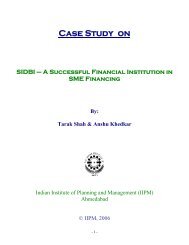
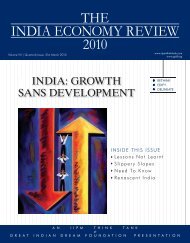
![[Feb 2008, Volume V Annual Issue] Pdf File size - The IIPM Think Tank](https://img.yumpu.com/43961117/1/190x245/feb-2008-volume-v-annual-issue-pdf-file-size-the-iipm-think-tank.jpg?quality=85)
![[June 2008, Volume V Quarterly Issue] Pdf File size - The IIPM Think ...](https://img.yumpu.com/41693247/1/190x245/june-2008-volume-v-quarterly-issue-pdf-file-size-the-iipm-think-.jpg?quality=85)
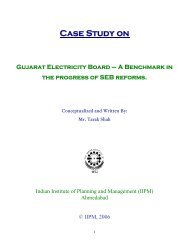
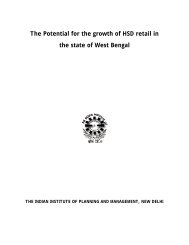
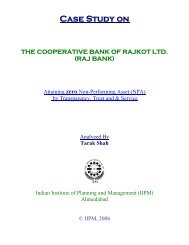
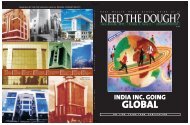
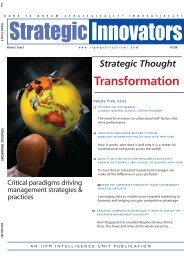
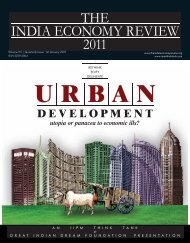
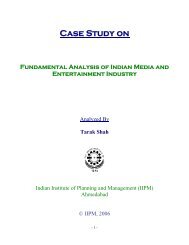
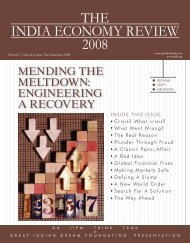
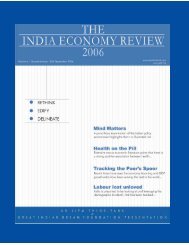
![[Volume VI | Quarterly Issue: 31st May 2009] Pdf File size](https://img.yumpu.com/27796051/1/190x245/volume-vi-quarterly-issue-31st-may-2009-pdf-file-size.jpg?quality=85)